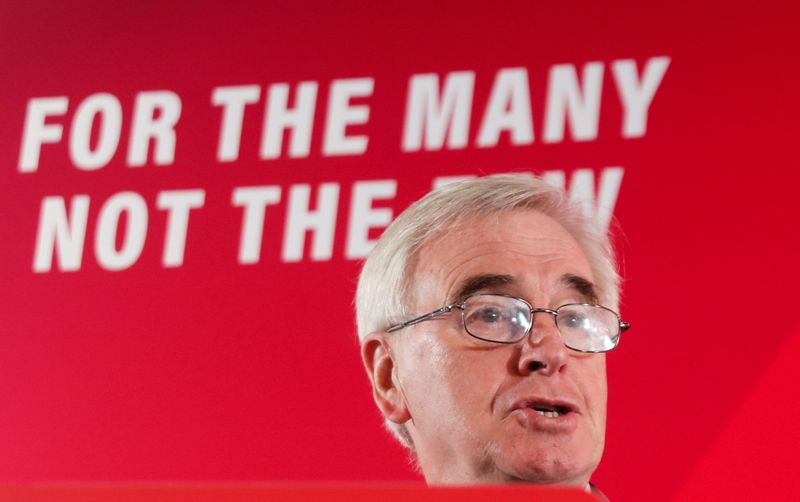By Andrew MacAskill and Kate Holton
LONDON (Reuters) - In April, the man who will be Britain's finance minister in a Labour government sought to reassure the head of the country's biggest telecoms group BT that it would not feature in his sweeping nationalization plans.
On the sidelines of a conference in London amid rumors about Labour's ambitions, John McDonnell told Chief Executive Philip Jansen: "BT is not part of our plans," according to a person briefed on the talks.
But without warning, McDonnell last month stunned the company and the business community by pledging to take over its broadband network and provide free internet for all if Labour wins power in this week's election. He has not met BT since.
McDonnell said he cannot remember what he discussed with BT but the account is probably accurate. The policy was developed a few months ago in response to anger among the public and business over slow broadband.
"This connectivity issue is absolutely critical to our economy," he told Reuters. "We are trying to develop a fourth industrial revolution here and we can't be held back by anyone."
The move confirmed the fears of many executives that McDonnell's promise of the most radical socialist government in British history will end the pro-business climate that has endured since the days of Margaret Thatcher.
Labour policies include plans to nationalize rail, mail, utility and water companies, give 10% of big companies' shares to staff, bring in a four-day working week, hike taxes on the wealthy, and ramp up borrowing and spending.
The party says social discontent behind Britain's shock 2016 vote to leave the European Union still runs deep, and voters who feel left behind by decades of unchecked capitalism and years of spending cuts will put Labour in power.
Prime Minister Boris Johnson's opinion poll lead has narrowed recently, meaning Labour could lead a minority government in charge of the world's fifth-largest economy.
Polls also show more than half of the public support nationalization of rail and water companies, higher taxes on the rich and putting workers on boards. But the agenda has put Labour on a collision course with business.
ABSTEMIOUS
McDonnell, 68, has spent the last three years meeting executives from companies such as Goldman Sachs (NYSE:GS) and Vodafone (LON:VOD) to explain his vision, drinking only tea to protect his abstemious reputation.
Once recorded encouraging disgruntled workers to spit into their bosses' tea, he now presents himself as a soft-spoken, pragmatic and affable figure. The combination of reassurance and radicalism makes him one of the most intriguing figures in British politics.
Executives are impressed by his eagerness to meet them, describing him as hard-working and open to ideas, attentive to their needs when it comes to Brexit and willing to explain his party's radical plans.
But they worry about what they say is his habit of producing policy changes out of the blue, despite assurances that he has "nothing up my sleeve" and "what you see is what you get".
In November, McDonnell was asked whether he would impose a windfall tax on oil and gas companies and if so, how it would work. "No and no," he replied. Days later the policy was included in the party's plans for a greener economy.
That followed Labour's announcement last year that it would force all large companies to hand over a tenth of their equity to the workforce. The British Chambers of Commerce said this was a "massive new source of uncertainty" that could hit investment.
John Caudwell, the billionaire founder of retailer Phones4u, told McDonnell in a radio program on Monday that while he welcomed efforts to narrow the gap between rich and poor he feared Labour would harden its policies once in government.
"I am not interested in manifestoes (policies) because you will change your mind when you get in power," he said.
McDonnell, who trained to be a priest, met top finance executives last month where he was challenged on plans to nationalize companies at a price set by parliament, potentially below market rates.
"If you sell private assets at under face value you'll never attract international investment again," said one executive who was there. "I don't think he gets it. He's a lifelong Marxist who wants to get his hands on the wheel."
McDonnell, who has previously described Marx, Lenin and Trotsky as political influences, declined to discuss private meetings. But he said most conversations with business leaders focused on the scale of investment Britain needed and the reaction was largely positive.
Once fired for being too radical from the hotbed of 1980s left-wing politics, the Greater London Council, McDonnell was installed as Labour's finance spokesman in 2015 when his friend Jeremy Corbyn became leader.
McDonnell believes Britain needs "an irreversible shift in the balance of power and wealth in favor of working people".

"We're setting our sights higher than any opposition party has ever done before, and we're doing that because we have to," he said. "Our agenda is radical because people are demanding change."